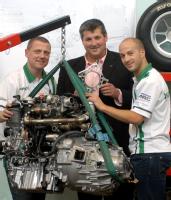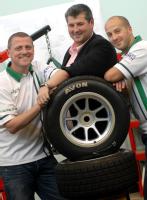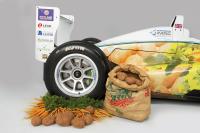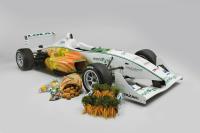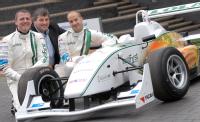Formula 3 racing car powered by chocolate and steered by carrots
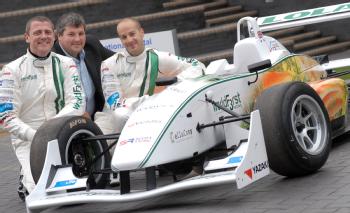 Researchers at the University of Warwick have today, Tuesday 5th May, unveiled the “WorldFirst Formula 3 racing car” which is powered by chocolate, steered by carrots, has bodywork made from potatoes, and can still do 125mph around corners.
Researchers at the University of Warwick have today, Tuesday 5th May, unveiled the “WorldFirst Formula 3 racing car” which is powered by chocolate, steered by carrots, has bodywork made from potatoes, and can still do 125mph around corners.
There has been much speculation about the creation of this car but it has now been completed and today is the first day it has actually been ready to drive.
Following the recent turmoil in Formula 1 arising from the high costs of running competitive motor racing teams, and doubts in sponsors’ minds over the commercial value of their involvement, the viability of motor racing is being critically questioned. With this in mind the University of Warwick team based in the University’s Warwick Manufacturing Group (WMG) and the Warwick Innovative Manufacturing Research Centre decided to build a competitive racing car using environmentally sustainable components to show the Industry just how much is possible using current environmentally sustainable technologies.
It is the first Formula 3 racing car designed and made from sustainable and renewable materials, putting the world first by effectively managing the planet’s resources. The car meets all the Formula 3 racing standards except for its biodiesel engine which is configured to run on fuel derived from waste chocolate and vegetable oil. Formula 3 cars currently cannot use biodiesel.
Dr Kerry Kirwan from the research team said:
“Components made from plants form the mainstay of the car’s make up, including a race specification steering wheel derived from carrots and other root vegetables, a flax fibre and soybean oil foam racing seat, a woven flax fibre bib, plant oil based lubricants and a biodiesel engine configured to run on fuel derived from waste chocolate and vegetable oil. It also incorporates a radiator coated in a ground-breaking emission destroying catalyst. “
Dr Steve Maggs from the research team said
“As original equipment manufacturers focus on decreasing engine emissions, to meet future CO2, the WorldFirst project proves that if you are going to wholeheartedly embrace the ‘green is great’ ethos you have to broaden your vision and have a strategy that stretches throughout the chain from the raw materials to the final disposal of the car. The project clearly demonstrates that automotive environmentalism can and should be about the whole package.”
Project Manager, James Meredith, said “It’s been very exciting working on the project and important for our team to develop a working example of a truly ‘Green’ motor racing car. The WorldFirst project expels the myth that performance needs to be compromised when developing the sustainable motor vehicles of the future”
Broadcast quality video is available for download here - check the 'for broadcast' box to view:
http://www2.warwick.ac.uk/newsandevents/pressreleases/vnr
Journalists should call Peter Dunn (details below) if this asks you for a password.
Click the thumbnails for hi-res images -
Click on pictures to be taken to high res versions - From left to right in the three shots with people above; Dr Kerry Kirwan, Dr Steve Maggs, Dr James Meredith
Peter Dunn, Press and Media Relations Manager
Communications Office, University House,
University of Warwick, Coventry, CV4 8UW, United Kingdom
email: p.j.dunn@warwick.ac.uk
Tel: +44 (0)24 76 523708 Mobile/Cell: +44 (0)7767 655860
Twitter: @PeterJDunn
PR33 5th May 2009
Broadcast quality video rushes (check the 'for broadcast' box)
Low quality video (via YouTube)

